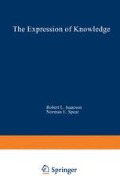Abstract
This chapter will have three major themes. The first is that the attainment and expression of knowledge depend on the hippocampus by virtue of its involvement in retrieval processes. We shall define retrieval somewhat more restrictively than is normally the case. By retrieval we mean the selection of a single or small set of memories from among a larger set having some common content. Knowledge of any one object or stimulus can be only as rich or diverse as retrieval processes allow. We think retrieval processes are central to the kinds of processes that were thought to be responsible for learning by theorists in the cognitive tradition, as exemplified by Tolman (1948). We think a cognitive learning system, which includes the hippo campus, is present in the brain.
Access this chapter
Tax calculation will be finalised at checkout
Purchases are for personal use only
Preview
Unable to display preview. Download preview PDF.
References
Black, A. H., Nadel, L., & O’Keefe, J. Hippocampal function in avoidance learning and punishment. Psychological Bulletin, 1977, 84, 1107–1129.
Blanchard, R. J., Blanchard, D. C., & Fial, R. A. Hippocampal lesions in rats and their effects on activity avoidance, and aggression. Journal of Comparative and Physiological Psychology, 1970, 71, 92–102.
Disterhoft, J. F., & Segal, M. Neuron activity in rat hippocampus and motor activity during discrimination reversal. Brain Research Bulletin, 1978, 3, 583–588.
Douglas, R. J. The hippocampus and behavior. Psychological Bulletin, 1967, 67, 416–442.
Estes, W. K. Toward a statistical theory of learning. Psychological Review, 1950, 57, 94–109.
Gabriel, M., Miller, J. D., & Saltwick, S. E. Unit activity in cingulate cortex and anteroventral thalamus of the rabbit during different conditioning and reversal. Journal of Comparative and Physiological Psychology, 1977, 91, 423–433.
Hays, W. L. Statistics for the social sciences. New York: Holt, Rinehart and Winston, 1973.
Herrman, T., Black, A. H., Anchel, H., & Ellen, P. Comparison of septal and fornical lesioned rats’ performance on the Maier three-table reasoning task. Physiology and behavior, 1978, 20, 297–302.
Hirsh, R. Previous stimulus experience delays conditioning induced changes in hippocampal unit responses in rats. Journal of Comparative and Physiological Psychology, 1973, 83, 337–345.
Hirsh, R. The hippocampus and contextual retrieval of information from memory: A theory. Behavioral Biology, 1974, 12, 421–444.
Hirsh, R., Leber, B., & Gillman, K. Fornix fibers and motivational states as controls of behavior: A study stimulated by the contextual retrieval theory. Behavioral Biology, 1978, 22, 463–478.
Hirsh, R., Davis, R., & Holt, L. Fornico-thalamus fibers, motivational states, and contextual retrieval. Experimental Neurology, 1979, 65, 373–390.
Hirsh, R., Holt, L., & Mosseri, A. Hippocampal mossy fibers, motivational states, and contextual retrieval. Experimental Neurology, 1978, 62, 68–79.
Hull, C. L. Principles of behavior. New York: Appleton-Century-Crofts, 1943.
Kaplan, J. Approach and inhibitory reaction in rats after bilateral hippocampal lesions. Journal of Comparative and Physiological Psychology, 1968, 65, 279–281.
Kimble, D. P. The effects of bilateral hippocampal lesions in rats. Journal of Comparative and Physiological Psychology, 1963, 56, 272–283.
Kimble, D. P. Hippocampus and internal inhibition. Psychological Bulletin, 1968, 70, 285–295.
Kimble, D. P., & Kimble, R. J. The effect of hippocampal lesions on extinction and “hypothesis” behavior in rats. Physiology and Behavior, 1970, 5, 735–738.
Kohler, W. Gestalt psychology. New York: Liverwright, 1929.
Lashley, K. S. Studies of cerebral function in learning. III. The motor areas. Brain, 1921, 44, 255–286.
MacFarland, D. A. The role of kinesthesis in maze learning. University of California Publications in Psychology, 1930, 4, 277–305.
Maier, N. R. F. Reasoning in white rats. Comparative and Physiological Monograph, 1929, 6, 1–93.
O’Keefe, J., & Nadel, L. The hippocampus as a cognitive map. New York: Oxford University Press, 1978.
Olton, D. S. Behavioral and neuroanatomical differentiation of response-suppression and response-shift mechanisms in the rat. Journal of Comparative and Physiological Psychology, 1972, 78, 450–456.
Olton, D. S., Becker, J. T., Handelmann, G. E., & Mitchell, S. J. Hippocampal function: Working memory on cognitive mapping. Physiological Psychology, 1980, 8, 239–246.
Penfield, W., & Milner, B. Memory deficit produced by bilateral lesions in the hippocampal zone. Archives of Neurology and Psychiatry, 1958, 79, 475–497.
Pisa, M. A. On the role of the hippocampus in episodic memory. Unpublished doctoral dissertation, McGill University, 1978.
Rabe, A., & Haddad, R. K. Integration deficit after hippocampal lesions. Proceedings of the 77th, 4nnual Convention of the American Psychological Association, 1969, 4, 213–214.
Schmaltz, L. W., & Theios, J. Acquisition and extinction of a classically conditioned response in hippocampectomized rabbits (Oryctologous cuniculus). Journal of Comparative and Physiological Psychology, 1972, 79, 328–334.
Sidman, M., Stoddard, L. T., & Mohr, J. P. Some additional quantitative observations of immediate memory in a patient with bilateral hippocampal lesions. Neuropsychologia, 1968, 6, 245–254.
Silveira, J. M., & Kimble, D. P. Brightness discrimination and reversal in hippocampally lesioned rats. Physiology and Behavior, 1968, 3, 625–630.
Spence, K. W. Continuous versus non-continuous interpretations of discrimination learning. Psychological Review, 1940, 47, 271–288.
Sutherland, N. S., & MacKintosh, N. J. Mechanisms of animal discrimination learning. New York: Academic Press, 1971.
Tolman, E. C. Cognitive maps in rats and men. Psychological Review, 1948, 55, 189–208.
Winocur, G., & Mills, J. A. Transfer between related and unrelated problems following hippocampal lesions in rats. Journal of Comparative and Physiological Psychology, 1970, 73, 162–169.
Author information
Authors and Affiliations
Editor information
Editors and Affiliations
Rights and permissions
Copyright information
© 1982 Plenum Press, New York
About this chapter
Cite this chapter
Hirsh, R., Krajden, J. (1982). The Hippocampus and the Expression of Knowledge. In: Isaacson, R.L., Spear, N.E. (eds) The Expression of Knowledge. Springer, Boston, MA. https://doi.org/10.1007/978-1-4684-7890-7_7
Download citation
DOI: https://doi.org/10.1007/978-1-4684-7890-7_7
Publisher Name: Springer, Boston, MA
Print ISBN: 978-1-4684-7892-1
Online ISBN: 978-1-4684-7890-7
eBook Packages: Springer Book Archive

